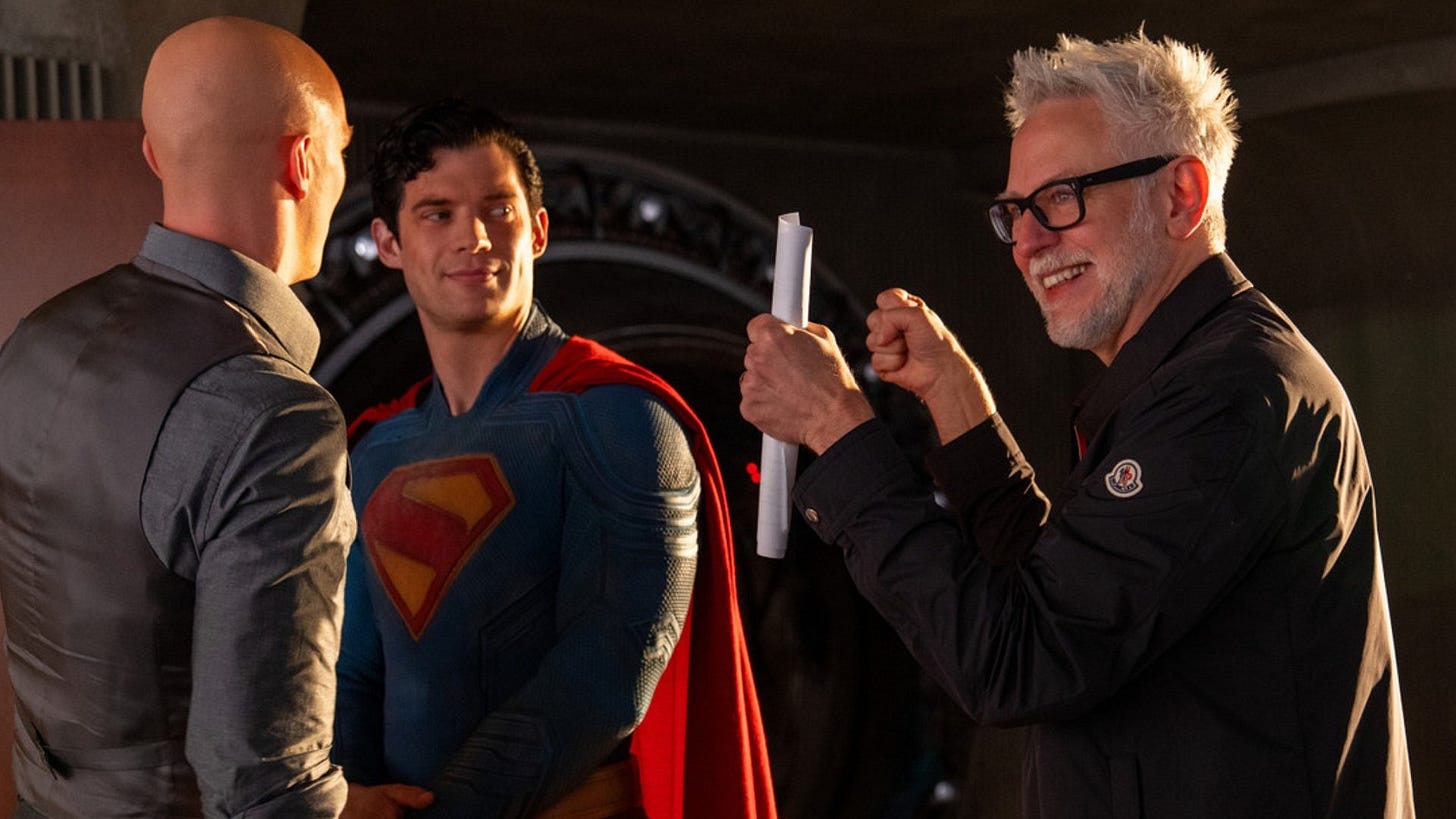The Real Superpowers of Kindness & Compassion
What James Gunn's Superman Reminds Us About the Gospel of Jesus Christ—And What It Means to Be Great
Let me tell you a story.
There was once an “alien” who came to earth. He had human parents, but he was actually a god. As he became an adult, he knew he had a special calling to serve others and bring hope.
He had great compassion on the people around him, even though some were suspicious of him. Even when the people he was trying to help turned against him, he gave himself up to protect them. He willingly made himself vulnerable and weak for their benefit. By the end of it all, he proudly identified with humanity even though he proved himself to be something much more.
When reading this, Christians might immediately think about our savior, the Son of God, Jesus Christ. But this is also the basic plot points from James Gunn’s portrayal of Superman in his 2025 blockbuster. I don’t assume Gunn intended to draw these parallels, but as I watched Superman (2025), the overlapping themes were immediately apparent. Gunn does something extraordinary with the Superman legend. A typical Superman tale is naturally going to focus on (1) the moral justice of the hero and (2) his superior physical strength and supernatural powers that enable him to defeat his enemies and save the day.
Spoiler alert: in Gunn’s retelling, yes enemies are defeated, Superman does save the day, but Gunn’s portrayal is far more than a show of force from the Man of Steel. The conversation and dialogical key that unlocks the heart of this movie happens in a pivotal, intimate exchange between Lois Lane and Clark Kent.
Lois — “We’re so different. I was just some punk rock kid from Bakerline and you’re…Superman.”
Clark — “I’m punk rock.”
Lois — [laughing] “You are not punk rock….My point is I question everything and everyone. You trust everyone and think everyone you ever met is, like…beautiful.”
Clark — “Maybe that’s the real punk rock.”
The last line almost functions as a question waiting to be answered, a thesis anticipating confirming evidence—and it comes. It turns, the real superpowers of the film are not super strength and heat vision, they are the twin virtues of compassion and kindness. This is a Superman that demonstrates greatness in suffering love. We mere mortals can’t live up to Superman’s physical capabilities, but it turns out that we humans taught Superman what it really means to be human—the softness of empathy and the hardness of conviction to act on that empathy through kindness, and he showed us what can be accomplished when we live into that fully.
He Was Crucified in Weakness?
Leaning into this thinking might help us solve a long-standing conundrum in a short statement from the apostle Paul: “[Christ] was crucified in weakness, yet he lives by God’s power” (2 Cor 14:3). This verse has always bothered me. It appears to be saying that Christ was crucified because he was [too] weak, and God had to go and bail him out in the resurrection. That is one way of looking at Christ, but it is certainly not Paul’s way of thinking.
I’ve been spending a lot of time recently in 2 Corinthians, and I am convinced that this letter is a long meditation on strength and weakness from a uniquely Christian perspective. Many of the immature Corinthian believers followed a simplistic understanding of power, which focused on external image and populist thinking: “might makes right” and all of that. While they accepted Paul’s gospel about Jesus Christ, it appears that they were drawn to Christ’s supreme status, his miraculous powers, and especially the power of the resurrection. They wanted the glorious Jesus, not the crucified one; but Paul told them that you can’t have one without the other—they go together. Paul explained much of this in 1 Corinthians, but in the second letter things get personal: the Corinthians argue that Paul talks a big talk in his letters, but face-to-face he is puny and weak. (He needs to pump some iron and take some public speaking lessons!)
Paul’s famous response to this is that you can’t measure a person based on a tally of pros versus cons, some kind of “perfect-human ratio,” where strengths far outweigh weaknesses. Quite the opposite, weakness is an opportunity to rely on the all-powerful God, and to see God create greatness in the midst of weakness (2 Cor 12:9-10).
This helps us go back to 2 Cor 13:4 and make sense out of it in context. Paul ends the letter with this chapter and reinforces that he (Paul) and Christ are both more than meets the eye. The Corinthians should not underestimate either of them, especially when they appear to be weak. When Paul writes, “he was crucified in weakness,” I actually don’t think he really means this literally. Paul was quoting back to the Corinthians something they thought about Christ. They didn’t like the vulnerable Christ. They saw that Christ as a failure. They liked the risen and glorious Christ. Paul’s point in repeating this back to them is this: you Corinthians are embarrassed of the cross, the so-called “weakness” of Christ, and you want to brush that under the rug and bask in the radiance of the glorified Christ. But the resurrection of Christ is actually God’s empowering affirmation of Christ, because Christ chose to go to the cross, willingly, to be shamed and cursed at and spat upon, and to appear weak, in order to save the least, the last, and the lost.
“[You Corinthians say] ‘he was crucified in weakness,’ [I say] yet he lives by God’s power [because he willingly suffered for us].”
That is why Paul boasts about his own “weaknesses.” He has been willing to go through all manner of humiliating struggles in order to be fully obedient to the Father, to do what is just and good and right, and especially to express compassion and demonstrate kindness to give life and well-being to others (2 Cor 4:12).
Paul didn’t think Christ was “weak,” not even the Christ who carried his cross. Paul didn’t think of one Christ as weak and another as strong. There is only one Christ, the one who lovingly gave his life for others, the one we celebrate as crucified, risen, and reigning.
I think what Paul was trying to do for the Corinthians was very much like what James Gunn is trying to do with the Superman legend: redefine greatness. It is not found merely in bulging muscles and miraculous physical feats. True greatness is found in how much we are willing to go against the grain to live according to compassion and kindness towards all.
Paul was determined to teach the Corinthians how to see all of life in a new way. Not power over, but power for. Not strength instead of weakness, strength in weakness. Not glory beyond cross, but glory on the cross. It requires a whole new way of thinking to rewire our perception to see love as the real superpower. We have to be willing to rise above the immature games we often play of “me vs. you,” “might makes right,” and “survival of the fittest.” We need not heavenly superpowers in our fists, but a heavenly perspective shift.







Love this, Nijay. Thanks for your work. I've puzzled over this same subject—Jesus's strength in/through weakness—in some of my writing. One way I sometimes think about it is as the strength/courage to face death. Facing death, particularly violent death, is surely one of the most difficult things a human being can do (!), and yet the fully-human Christ did it willingly for us. That exhibits love, for sure, but also courage and strength. Just a parallel thought.
I love this so much! Thanks for writing (& the podcast :-))